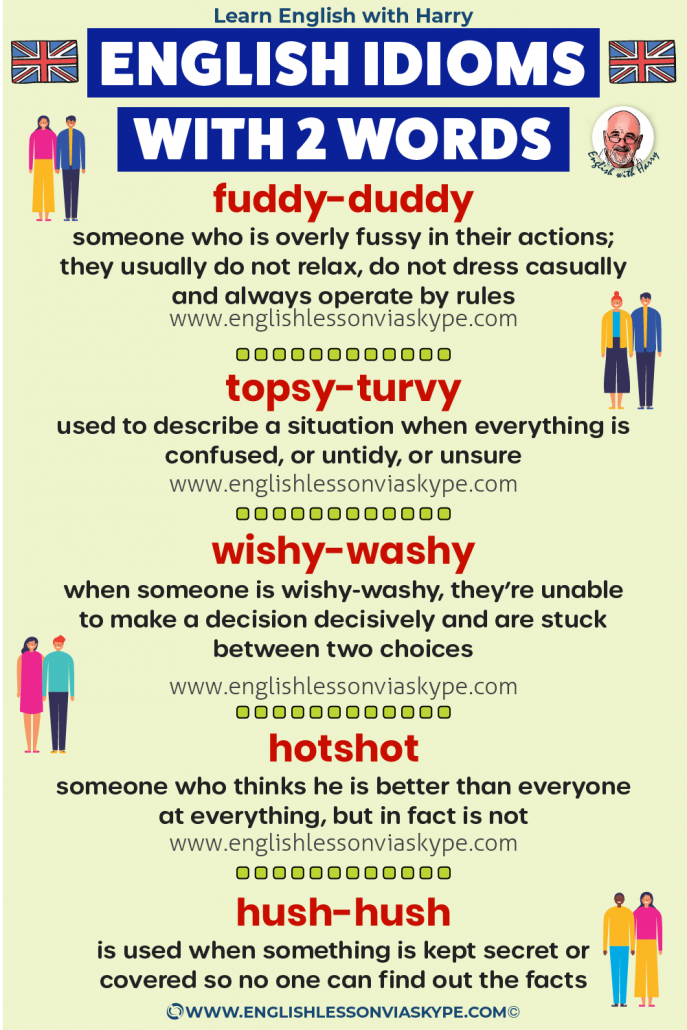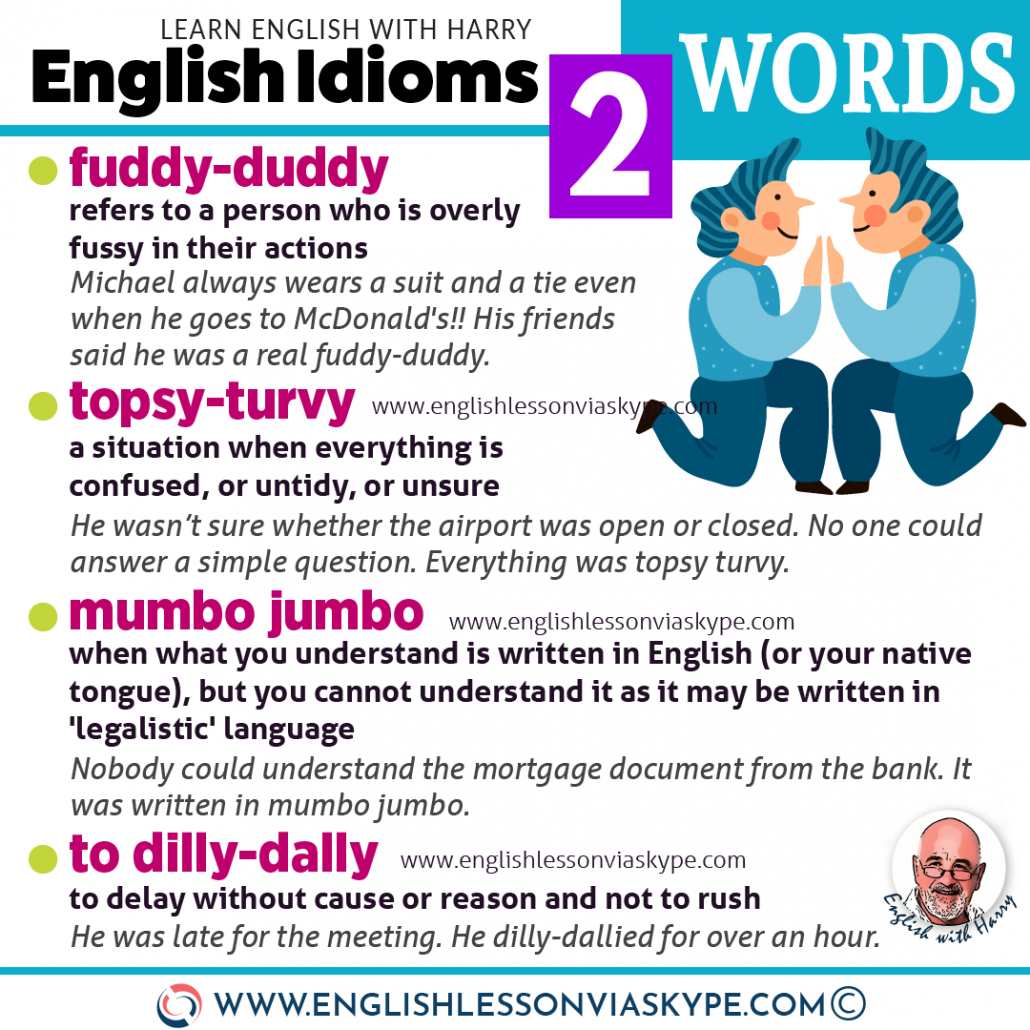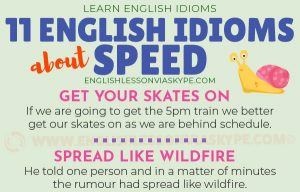In spoken English, we often use two-word phrases, such as “bye-bye”. Here are 15 of the most common two word phrases, with more in the quiz below.
so-so = OK: “How was the meeting?” “So-so – it was nice to see everyone, but we didn’t get anything decided.”
on-off = not constant: “They have a very on-off relationship.”
love-hate = having feelings for someone / something which swing from love to hate: “I have a bit of a love-hate relationship with my car.”
mish-mash = when things are combined together and so appear untidy: “The new policy is a bit of a mish-mash of the last two policies we’ve had.”
riff-raff = quite a ‘snobby’ expression to describe people you think are lower in class than you: “Lets send out invitations for the party. We don’t want the town’s riff-raff turning up and eating all the food.”
chit-chat = small talk or unimportant conversation: “He asked us to stop our chit-chat and get on with our work.”
knick-knack = an ornament: “She’s got a lot of knick-knacks – I’m always afraid I’m going to break one.”
ship-shape = everything in its right place: “I want to leave the place ship-shape when we go on holiday.”
zig-zag = diagonally: “He lost control of the car and it zig-zagged across the road.”
ding-dong = an argument: “They’ve had a bit of a ding-dong and they’re not talking to each other at the moment.”
higgledy-piggledy = in a mess: “That bookshelf is all higgledy-piggledy!”
wishy-washy = weak opinion, argument or person: “His argument is a bit wishy-washy – I don’t get the impression that he really knows what he wants to think.”
easy-peasey = something that children often say to emphasise how easy something is: “This program is easy-peasey – I understood it in half an hour!”
flip-flops = rubber sandals with a thong that goes between your big and second toe: “I lived in my flip-flops when I was staying on the beach.”
see-saw = something that goes up and down (like the piece of wood in a playground – a child sits on each end and these ends go up an down): “The English pound has see-sawed against the American dollar for the last two weeks.”
Two-Word Phrases
Choose the correct answer.
And, finally…
Watch the video!
Listen
and Learn: The Intonation of Two-Word Expressions
Many people think that pronunciation is what
makes up an accent. It may be that pronunciation
is very important for an understandable accent.
But it is intonation that gives the final
touch that makes an accent correct or native.
Intonation is the «music» of a language,
and is perhaps the most important element of a correct
accent. Often we hear someone speaking with perfect
grammar, and perfect formation of the sounds of
English but with a little something that gives her
away as not being a native speaker.
Therefore, it is necessary to realize that there
is more than the correct pronunciation of the vowels
and consonants of a language. This is very important
and we do stress it in other articles. But it is
only one of the three components to an accent,
pronunciation, intonation, and linking.
In other places we will examine the correct pronunciation
of vowels and consonants, and linking, the way that
syllables within a word, and the beginning and ending
of words come together.
But in this article we will look at how the difference
that intonation makes in the daily use of a proper
North American English accent. The practice will
help you to notice, practice, and master the different
intonation patterns that you will discover as you
concentrate more on your use of North American English.
Two Word Stress
Knowing when and where to stress the words you use
is very important for understanding, and therefore,
as part of a good accent. A clear example is that
of stress in two word expressions.
According to whether it is an ordinary two-word
expression or a special, set expression, the place
of the stress changes. In an ordinary expression
the two words are used to describe something like
a «white HOUSE» (meaning a house that
is painted white, and not blue or gray). In this
case the most important note is the noun
because we are talking about a house that
happens to be white. Similarly, a «fat BOY» is an overweight young male.
But sometimes short two word expressions are set
or «consecrated», (that is, they mean
something special) and have to be made different
from similar expressions. One example is «the
WHITE house» where Mr. Bush lives. In this
case, the emphasis is on the adjective because
we are more interested in stressing that it is the
house that is known because it is white.
In the same way, «FAT boy» is the nickname
of a boy, chosen because the word fat emphasizes
his weight.
It will be useful for you to be aware of both types
of two word expressions. Here is a list of a few
that will get you thinking and give you some practice
in identifying them and using them correctly. Underline
the syllable that is stressed, and write a brief
explanation, for both uses of each phrase. I start
the exercise with two examples. You do the rest.
Make sure you say the phrases OUT LOUD!
WHITE house
In Washington
white HOUSE
House painted white
LIGHT bulb
Shines with electricity
Light BULB
A bulb that is not heavy
Now do these, underling the syllable that is
stressed, and defining the word that has the indicated
intonation.
Dark room, Dark room
A cold fish, A gold fish
The paper box, The paper box
An old key, A door key
A nice watch, A wrist watch
A sticky web, A spider web
A clean cup, A coffee cup
A toy gun, A water gun
A bright star, A movie star
A new ball, A foot ball
A sharp knife, A steak knife
An old brush, A hair brush
A dry leaf, A fig leaf
A pointy tack, A thumb tack
A blackboard, A black board
A green house, A green house
For more articles on intonation, search with the
keyword «intonation».
About the Author: Frank Gerace Ph.D has worked
in Latin America on UN and national Educational and
Communication Projects, and has taught in Bolivian
and Peruvian Universities. He currently teaches English
in New York City at La Guardia College/CUNY. He provides
resources on accent reduction and the proper American
English accent at http://www.GoodAccent.com
The following are very common English idioms with two words. They are used in everyday conversations. In modern communication more informal language is now frequently used to substitute for more formal words and phrases.
List of Idioms
Harry
Harry is a native English teacher with over 10 years of experience both online and in face-to-face lessons. With his extensive experience in business, he specialises in Business English lessons but happily teaches ESL students with any English learning needs.
11 Common English idioms with two words
fuddy-duddy
this refers to a person who is overly fussy in their actions. They usually do not relax, do not dress casually and always operate by the rules.
Example:
Michael always wears a suit and a tie even when he goes to McDonald’s!! His friends said he was a real fuddy-duddy.
topsy-turvy
used to describe a situation when everything is confused, or untidy, or unsure
Example:
The weather was very bad. He was due to fly at noon, but he wasn’t sure whether the airport was open or closed. No one could answer a simple question. Everything was topsy turvy.
mumbo jumbo
when what you understand is written in English (or your native tongue), but you cannot understand it as it may be written in ‘legalistic’ language
Example:
Nobody could understand the mortgage document from the bank. It was written in mumbo jumbo.
Intermediate to Advanced English Marathon
INSANITY: doing the same thing over and over again and expecting different results.
- What you’ll learn:
- better understanding of more complex grammar structures
- advanced English vocabulary words
- British & American slang
- perfect your listening skills through practing different accents
- This marathon is for you if you’re:
- stuck at an intermediate English level
- tired of confusing explanations
- a mature student
- shy & introverted
wishy-washy
When a person is unable to make a decision decisively and is stuck between two choices. We can describe him as wishy-washy.
Example:
John could not decide whether to complain about the bad food in the restaurant. Eventually, he decided not to say anything ad even gave the waiter a tip!! His wife said he was wishy-washy.
hotshot
someone who thinks he is better than everyone at everything, but in fact is not
Example:
He hired a hotshot lawyer from London to defend him in his law case but he was still found guilty.
hush-hush
when something is kept secret or covered up so no one can find out the facts.
Example:
He worked for the secret service but nobody knew exactly what he did it was all hush hush.
English Idioms with Two Words
to dilly-dally
to delay without cause or reason and not to rush.
Example:
He was late for the meeting but continued to do this and that in his office and took his time in everything. He dilly-dallied for over an hour.
humdrum
this refers to ordinary routine aspects of our lives. People often look for some distraction from the humdrum of life.
Example:
He worked every day from 8 am to 6 pm and after six months decided to take a long holiday away from the humdrum of his work.
pitter-patter
usually refers to the sound that small footsteps make and is used to refer to a happy announcement that a woman is expecting a baby.
Example:
She was delighted to tell her husband that after 2 years of marriage they were going to hear the tiny pitter-patter of baby feet. She would have her baby in about six months.
tip-top
when you are in good health or when everything is working well.
Example:
He went to the doctor and was in perfect health. His business was doing well and his family were happy. He was tip-top. In fact, everything was tip-top.
wheeler-dealer
used to describe a businessman who deals in lots of business transactions on a regular basis, buying and selling.
Example:
He bought and sold cars every day in all parts of the country. He bought them cheap and sold them for a small profit quickly. He was a real wheeler-dealer.
Idioms are fun to use and appear regularly in formal and informal speech. Enjoy using these common English idioms with two words where and when you can!
More Information
You will love these English lessons
Useful English Collocations
English Idioms
English Vocabulary
CHECK YOUR ENGLISH FOR MEDICINE
3. TWO-WORD EXPRESSIONS
Make 15 two-word expressions connected
with medicine by combining words from the two lists: A and B. Match each
expression with the appropriate phrase. Use each word once. The first one has
been done for you as an example.
|
A |
B |
|
|
allergic |
anaesthetic |
|
|
alanced |
attack |
|
|
bedside |
clock |
|
|
biological |
death |
|
|
bone |
diet |
|
|
brain |
intervention |
|
|
clinical |
manner |
|
|
digestive |
marrow |
|
|
general |
practitioner |
|
|
general |
reaction |
|
|
heart |
surgery |
|
|
malignant |
system |
|
|
plastic |
tooth |
|
|
primary |
trial |
|
|
surgical |
tumour |
|
1 |
A heart attack |
9 |
An ____________________________________________ |
|
2 |
A substance ____________________________________________ |
10 |
A trial carried ____________________________________________ |
|
3 |
Soft tissue in ____________________________________________ |
11 |
A tumour which ____________________________________________ |
|
4 |
The treatment ____________________________________________ |
12 |
A doctor who ____________________________________________ |
|
5 |
Any one of the ____________________________________________ |
13 |
The rhythm of ____________________________________________ |
|
6 |
Surgery to ____________________________________________ |
14 |
The set of ____________________________________________ |
|
7 |
A condition in ____________________________________________ |
15 |
A diet that provides ____________________________________________ |
|
8 |
The way in ____________________________________________ |
ANSWER
KEY
|
1 |
heart attack |
|
2 |
general anaesthetic |
|
3 |
bone marrow |
|
4 |
surgical intervention |
|
5 |
primary tooth |
|
6 |
plastic surgery |
|
7 |
brain death |
|
8 |
bedside manner |
|
9 |
allergic reaction |
|
10 |
clinical trial |
|
11 |
malignant |
|
12 |
general practitioner |
|
13 |
biological |
|
14 |
digestive system |
|
15 |
balanced diet |
Phrasal verbs in English are verbs that consist of two or sometimes three words, such as check in or come up with.
These expressions always begin with a verb, but also include a preposition, an adverb, or both. Although phrasal verbs have at least two words, their meanings are usually different from the meanings of each individual word in the expression. Since English uses a lot of phrasal verbs, it is important to understand as many of them as possible.
Today I give you examples of three types of phrasal verbs: separable, inseparable, and common English phrasal verbs in families At the end there will be a sheet you can download to give you more practice with phrasal verbs.
Here is the video lesson I taught on phrasal verbs in English:
Subscribe to our YouTube Channel to see all of our lessons and get the latest videos right away!
You can download the practice sheet NOW!
Some phrasal verbs in English are separable.
In phrasal verbs that are separable, you can separate the verb and the the preposition or adverb (also called the particle), and it still makes sense. All separable phrasal verbs are transitive, which means they take a direct object. In a separable phrasal verb, the direct object may be placed between the verb and the preposition or adverb. However, you can also keep the entire expression together. Both ways are correct. Separable phrasal verbs can be used in any tense. Here are some examples.
To call off –This means to cancel.
Everyone is sick, so we need to call off the committee meeting. In this case, call off is together.
Everyone was sick, so we called the committee meeting off. Here, the committee meeting, the direct object, is between called and off.
To pick up –This means to go somewhere and get someone.
I have to pick up my son from school. Pick up is together.
I have to pick my son up from school. My son is a direct object. It is between pick and up.
Some phrasal verbs in English are inseparable. Verbs that don’t take a direct object are always inseparable. However, some phrasal verbs that do take a direct object are inseparable, as well.
When phrasal verbs are inseparable, it means that the verb and the preposition or adverb must stay together. If we separate them, the meaning doesn’t make sense. Inseparable phrasal verbs may or may not have a direct object. They can, like separable phrasal verbs, be in any tense.Here are some examples of inseparable phrasal verbs.
To go over — to review.
The teacher went over the chapter to prepare us for the test. You cannot say,”The teacher went the chapter over.” If you said that, it would be incorrect and many people would not understand you.
To cut down on — to use less of something.
I need to cut down on sugar because I have too many cavities in my teeth.
To chip in –to help
Everyone needs to chip in so we can get this mess cleaned up. There is no direct object here.
Now that you know about separable and inseparable phrasal verbs, you may wonder,” How do I know if a phrasal verb with a direct object is separable or inseparable?” Unfortunately, there are no rules to guide you. Native speakers, of course, simply know. Others, however, have to learn them, verb by verb. If you are not sure, look the phrasal verb up in a good online or paper dictionary, and then you will know.
Some phrasal verbs come in families. Even though they are in the same family, however, these verbs may have many different meaning from each other, and some may have more than one meaning. Below I talk about three common phrasal verb families. I give you the phrasal verb, the meaning or meanings, example sentences, and I tell you whether it is separable or inseparable.
The give family
The go family
The put family
- To put off
(separable)–(1) to delay doing something, or (2) to have a bad impression of someone or something
- I am putting off doing my homework. (or I am putting doing my homework off.)
- His bad attitude put me off. (or I felt put off by his bad attitude).
- To put on
(separable)–(1) to wear, or (2) to produce a show, (3) to trick someone
- Put your boots on. (or Put on your boots.)
- They are putting on a great concert at the Pepsi Center. (or They are putting a concert on.)
- You didn’t win the lottery! You’re putting me on! When we use put on to mean trick, we always separate the verb and the particle.
- To put out
(separable)–(1) to get rid of a fire, or (2) to publish something, or (3) to inconvenience someone.
- The fire fighters put out the fire. (or They put the fire out.)
- The Denver Post puts out a newspaper every day (or They put a newspaper out.)
- Would it put you out if I stayed for dinner? ( or Would you be put out if I stayed for dinner?)
- To put up with
(inseparable)–to tolerate something unpleasant.
- I can’t put up with my nephew’s terrible behavior.
You now know the phrasal verbs are very important parts of English. You know know that these verbs consist of two or three words and may be separable or inseparable. The download contains a list of many common phrasal verbs, their meanings, and whether they are separable of inseparable.
You can download the practice sheet NOW!
Idioms of the Day
-
- To think twice
–to think very carefully before making a decision. I would think twice about driving too fast in this neighborhood. There are policemen everywhere.
- To roll with the punches
–to survive and do well, even though things have been hard for you. My friend’s father died when he was small, his mother was often sick, and last month he lost his job. But he always rolls with the punches and never gives up.
- To think twice






